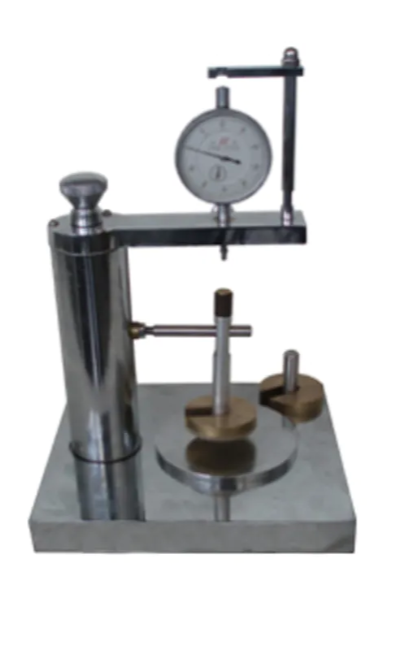Measures carpet thickness under a standardized pressure for quality control.
WhatsApp : +86 13816217984
Email : info@qinsun-lab.com

Product Introduction:
The thickness of a carpet is a fundamental characteristic used in material specification, quality control, and assessing features like pile height and overall bulk. Due to their resilient nature, carpets compress under load. Therefore, simply measuring thickness without applying a standard pressure would yield inconsistent results. A Resilient Carpet Thickness Tester applies a defined pressure to a specific area of the carpet specimen, ensuring that the measurement is taken under standardized conditions, making results comparable.
The tester typically consists of a flat base plate upon which the carpet specimen is placed. A presser foot with a precisely defined area and shape (often circular) is positioned above the specimen. A mechanism is used to apply a specified downward pressure to the presser foot. This pressure can be generated by a calibrated weight placed directly onto the presser foot assembly, a calibrated spring mechanism, or sometimes a pneumatic system. A displacement measuring device, such as a dial gauge, digital indicator, or linear encoder, measures the vertical distance between the bottom surface of the presser foot and the top surface of the base plate while the specified pressure is applied to the carpet specimen. This measured distance is the thickness of the carpet under the test load. The presser foot is typically lowered gently onto the specimen to avoid dynamic effects from impact.
The instrument is used in laboratories for:
Measuring the total thickness of carpets and other textile floor coverings under a standardized pressure.
Determining pile height by measuring total thickness and backing thickness separately (using different procedures).
Quality control during carpet manufacturing to ensure product consistency in thickness.
Material specification and comparison based on thickness values.
Research and development of new carpet constructions and materials.
Ensuring compliance with product specifications and industry standards.
Product Advantages:
Provides objective, quantitative measurement of carpet thickness under a standardized load.
Essential for quality control, material specification, and characterization of resilient textile floor coverings.
Accounts for the compressible nature of carpets, ensuring consistent and repeatable measurements.
Standard compliant test methods (ASTM D418. ISO 1765) are widely used for carpet thickness evaluation.
Useful for product development, comparison, and assessing characteristics related to thickness.
Meet the standard:
ASTM D418
ISO 1765
ISO 5084
Product Features:
Based on typical Resilient Carpet Thickness Testers:
Flat, stable base plate to support the carpet specimen during testing.
Presser foot with a precisely defined area and shape (e.g., circular presser foot with a specific diameter) as specified by the relevant standard.
Mechanism for applying a specified downward pressure to the presser foot. This is typically achieved using a calibrated weight or a calibrated spring system.
Displacement measuring device (e.g., mechanical dial gauge, digital indicator, linear encoder) to accurately measure the vertical distance between the bottom of the presser foot and the top of the base plate while the pressure is applied.
Mechanism to lower the presser foot onto the specimen smoothly and gently to avoid impact loading.
Digital or analog display showing the measured thickness.
Durable construction suitable for use in a laboratory or manufacturing environment.
Carpet Thickness Gauge – Typical Technical Parameters (English)
Measuring Range
0 – 25 mm (0 – 1 in)
0 – 50 mm (optional extended anvil kit)
Resolution
0.01 mm (0.0005 in)
Accuracy
±0.02 mm (±0.001 in) or ±1 % of reading, whichever is greater
Measuring Force / Pressure Foot
0.7 ± 0.1 N (70 ± 10 g)
Pressure-foot diameter: 25.4 mm (1 in)
Dead-weight or spring-loaded system (ISO 1765 / ISO 1766 compliant)
Anvil / Base Plate
Flat, lapped stainless steel, 50 mm × 50 mm
Optional “spiked” anvil for high-pile carpets
Depth-of-Frame (Throat)
120 mm (nominal) – accommodates folded or wide carpet samples
Display
Digital LCD, 0.35 in high digits
Zero-setting and hold functions
Power Supply
SR44 (1.55 V) silver-oxide cell – ~20 000 h operation
Operating Conditions
+5 °C to +40 °C, ≤ 80 % RH (non-condensing)
Dimensions & Mass
170 × 60 × 25 mm (gauge head)
Net weight: 0.3 kg

Qinsun Instruments Co., LTD is a professional laboratory testing instrument manufacturer in China,Have been focusing on laboratory instrument R&D more than 30 years and have rich industry experience,Based on international testing standards,We are also the instrument supplier for BV SGS laboratory,We provide one-stop solutions for lab instruments,Free Training and Turn-Key Service,Products exported all over the world,Offer 36 month warranty and are a trustworthy partner.
Company Phone
+86-21-6420 0566
Working hours
Monday to Friday
Mobile phone:
13816217984
Email:
info@qinsun-lab.com
